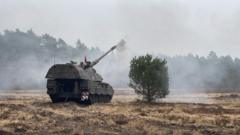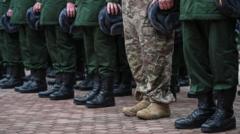In a historic move, Germany has decided to ramp up its military investment, motivated by fears of potential aggression from Russia. The Bundeswehr, Germany's armed forces, has received approval to implement substantial funding increases after the parliament voted to exempt defense spending from strict debt regulations. The urgency for this shift stems from the ongoing conflict in Ukraine and a growing belief that Russia poses a continual threat not just to its neighbor but to Europe as a whole.
**Germany's Military Awakening: A Reaction to Modern Threats**

**Germany's Military Awakening: A Reaction to Modern Threats**
Germany pivots from its pacifist traditions to significantly enhance military readiness amidst rising global tensions.
The traditional reluctance among Germans to embrace militarism—rooted in the country's historical actions in both world wars—has begun to dissolve. The recent Russian invasion of Ukraine has changed perspectives on defense in Germany. General Carsten Breuer, head of the armed forces, has emphasized the immediate need for more troops and resources, citing inadequacies not just in terms of personnel but essential supplies. A recent report revealed dire shortages across various domains within the Bundeswehr, including inadequate infrastructure for troops and outdated weaponry.
In a contrast to their earlier approach, the current German government, led by Chancellor Olaf Scholz, is now committing funds towards a more robust military posture. A significant €100 billion has been allocated for modernization efforts. However, military officials have indicated that while this is a start, more is required, including a potential return to conscription to increase troop numbers amid evolving security threats.
Public sentiment towards military spending is shifting, according to recent polls suggesting a heightened recognition of the risks posed by figures like Vladimir Putin, as well as a broader skepticism towards the reliability of U.S. support. This awakening is evident in the voices of younger Germans—who are increasingly advocating for a reinvigorated commitment to defense in response to modern-day challenges, even if it means changing deeply ingrained beliefs about militarism.
As discussions continue regarding how best to resurrect the military's numbers and capabilities, it’s clear that Germany is navigating a pivotal moment in its post-war identity—one shaped by contemporary threats and the necessity of ensuring national and regional security.
The question remains not only whether Germany is ready for war but how it will reshape its military doctrine in the years to come.
In a contrast to their earlier approach, the current German government, led by Chancellor Olaf Scholz, is now committing funds towards a more robust military posture. A significant €100 billion has been allocated for modernization efforts. However, military officials have indicated that while this is a start, more is required, including a potential return to conscription to increase troop numbers amid evolving security threats.
Public sentiment towards military spending is shifting, according to recent polls suggesting a heightened recognition of the risks posed by figures like Vladimir Putin, as well as a broader skepticism towards the reliability of U.S. support. This awakening is evident in the voices of younger Germans—who are increasingly advocating for a reinvigorated commitment to defense in response to modern-day challenges, even if it means changing deeply ingrained beliefs about militarism.
As discussions continue regarding how best to resurrect the military's numbers and capabilities, it’s clear that Germany is navigating a pivotal moment in its post-war identity—one shaped by contemporary threats and the necessity of ensuring national and regional security.
The question remains not only whether Germany is ready for war but how it will reshape its military doctrine in the years to come.





















